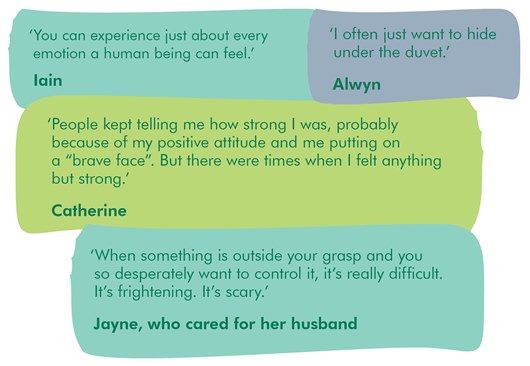Today is World Mental Health Day, and we are taking the opportunity to share some tips on dealing with difficult emotions. In this blog, written by editor Elissia, we explain some positive steps you could take to help you cope with the emotions cancer can bring.

Cancer can bring with it many different emotions. This is true whether you have cancer yourself, look after someone with cancer or if someone close to you has cancer. You might find that you feel:
There is no right or wrong way to feel, and people have different emotions at different times. You might feel confused sometimes about what you are feeling, and might have frequent mood swings. These changing emotions are part of the process many people go through when dealing with their illness, or when someone close to them is ill.
There are some positive things you can do to help you cope with your emotions and feel better. Some of these tips are specifically for people with cancer, but most of them will also help if you are a carer, or if someone close to you has cancer.
If you are looking after someone with cancer – you may be under a lot of stress. It’s normal to have many different feelings, such as resentment or anger. You may also feel lonely or isolated, and might not feel you have time to go out and socialise. To find out more about coping with these emotions, talking about them and looking after yourself while caring, visit our section for carers.
If your partner, family member or friend has cancer – you may have many different feelings to cope with. How you are affected depends on your relationship with the person who has cancer. For more information and support, visit our website.
Getting more information support
If you would like more information support, you can call our cancer information specialist between 9am and 8pm, Monday to Friday on 0808 808 00 00. There is also lots of support available on the Online Community, especially if you are feeling down or in need of a friendly ear.
You might also find our booklet How are you feeling - the emotional effects of cancer helpful. It is for people who have cancer, but might also help family and friends.
To see what else Macmillan's cancer information team has been blogging about, please visit our blog home page! You can subscribe to receive our blogs by email or RSS too.
We're with you every step of the way
The Macmillan team is here to help. Our cancer support specialists can answer your questions, offer support, or simply listen if you need a chat. Call us free on 0808 808 00 00.
Comments? Feel free to add them below (you need to be logged in).
Keep in touch Follow Macmillan’s cancer information team on Twitter @mac_cancerinfo
Whatever cancer throws your way, we’re right there with you.
We’re here to provide physical, financial and emotional support.
© Macmillan Cancer Support 2026 © Macmillan Cancer Support, registered charity in England and Wales (261017), Scotland (SC039907) and the Isle of Man (604). Also operating in Northern Ireland. A company limited by guarantee, registered in England and Wales company number 2400969. Isle of Man company number 4694F. Registered office: 3rd Floor, Bronze Building, The Forge, 105 Sumner Street, London, SE1 9HZ. VAT no: 668265007